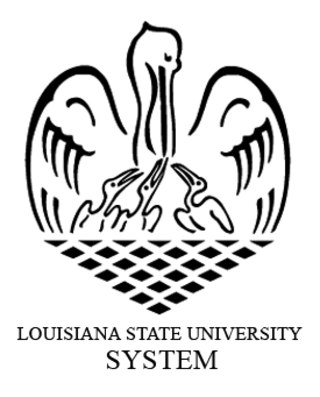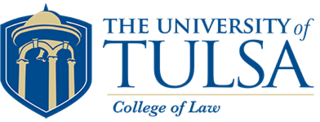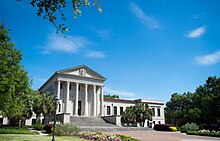
The Louisiana State University System is a system of public colleges and universities in Louisiana. It is budgetarily the largest public university system in the state.

Stanford Law School (SLS) is the law school of Stanford University, a private research university near Palo Alto, California. Established in 1893, Stanford Law had an acceptance rate of 6.28% in 2021, the second-lowest of any law school in the country. Paul Brest currently serves as Interim Dean.
Paul Macarius Hebert (1907–1977) was a jurist who is best known as the longest serving Dean of the Louisiana State University's law school, serving in that role with brief interruptions from 1937 until his death in 1977. One such interruption occurred in 1947-1948 when he was appointed as a judge for the United States Military Tribunals in Nuremberg, and presided over the IG Farben Trial.

The University of Memphis Cecil C. Humphreys School of Law is an American Bar Association accredited law school and is the only law school in Memphis, Tennessee. The school has been associated with the University of Memphis since the law school's formation in 1962. The school was named in honor of former University president Cecil C. Humphreys. It is also referred to as U of M Law, Memphis Law, or Memphis Law School.
Florida State University College of Law is the law school of Florida State University located in Tallahassee, Florida. It is the second highest ranked law school in Florida and is ranked in the top 50 best law schools in the U.S. The College of Law also holds the second highest bar passage rate in the state.

Chicago-Kent College of Law is the law school of the Illinois Institute of Technology, a private research university in Chicago, Illinois. It is the second oldest law school in the state of Illinois.

Case Western Reserve University School of Law is one of eight schools at Case Western Reserve University in Cleveland, Ohio. It was one of the first schools accredited by the American Bar Association. It is a member of the Association of American Law Schools (AALS). It was initially named for Franklin Thomas Backus, a justice of the Ohio Supreme Court, whose widow donated $50,000 to found the school in 1892.

The University of Tulsa College of Law is the law school of the private University of Tulsa in Tulsa, Oklahoma. For 2023, U.S. News & World Report ranked the University of Tulsa College of Law at No. 111 among all law schools in the United States. It is the only law school in the Tulsa Metropolitan Area and northeastern Oklahoma.
The University of Texas School of Law is the law school of the University of Texas at Austin, a public research university in Austin, Texas. According to Texas Law’s ABA disclosures, 87.20% of the Class of 2022 obtained full-time, long-term bar passage required employment nine months after graduation.
The University of Idaho College of Law is the law school of the University of Idaho. Its main location is in Moscow, and a second campus is in the state capital of Boise. As of the entering class of 2017–18, students may take all three years of instruction at either location. The UI College of Law was established in 1909, has been a member of the Association of American Law Schools since 1914, and has been accredited by the American Bar Association (ABA) since 1925. In the 2023 rankings, U.S. News & World Report ranked Idaho Law at #142 of ABA-accredited law schools in its annual law school rankings.

Loyola University New Orleans College of Law is a private law school in New Orleans, Louisiana affiliated with Loyola University New Orleans. Loyola's law school opened in 1914 and is now located on the Broadway Campus of the university in the historic Audubon Park District of the city. The College of Law is one of fourteen Jesuit law schools in the United States. It is also one of the few law schools in the nation to offer curricula in both Civil Law and Common Law. The school releases several academic journals, most notable of which is the Loyola Law Review.

The Gonzaga University School of Law is the professional school for the study of law at Gonzaga University. Established in 1912, the Jesuit-affiliated law school has been fully accredited by the American Bar Association since 1951, and is a member of the Association of American Law Schools.
SMU Dedman School of Law, commonly referred to as SMU Law School or Dedman School of Law, is a law school located in Dallas, Texas. It was founded in February 1925. SMU Law School is located on the campus of its parent institution, Southern Methodist University.

The University of Colorado Law School is one of the professional graduate schools within the University of Colorado System. It is a public law school, with more than 500 students attending and working toward a Juris Doctor or Master of Studies in Law. The Wolf Law Building is located in Boulder, Colorado, and is sited on the south side of the University of Colorado at Boulder campus. The law school houses the William A. Wise Law Library, which is a regional archive for federal government materials and is open to the public. United States Supreme Court Justice Wiley Blount Rutledge graduated from the University of Colorado Law School in 1922.

Southern University Law Center is a public law school in Baton Rouge, Louisiana. It is part of the historically black Southern University System and was opened for instruction in September 1947. It was authorized by the Louisiana State Board of Education as a Law School for blacks to be located at Southern University, a historically black college, and to open for the 1947-1948 academic session.

The University of Washington School of Law is the law school of the University of Washington, located on the northwest corner of the main campus in Seattle, Washington. The school is fully accredited by the American Bar Association and has been a member of the Association of American Law Schools since 1909.

Tulane University Law School is the law school of Tulane University. It is located on Tulane's Uptown campus in New Orleans, Louisiana. Established in 1847, it is the 12th oldest law school in the United States.

The University of Missouri School of Law is the law school of the University of Missouri. It is located on the university's main campus in Columbia, forty minutes from the Missouri State Capitol in Jefferson City. The school was founded in 1872 by the Curators of the University of Missouri. Its alumni include governors, legislators, judges, attorneys general, and law professors across the country. According to Mizzou Law's 2016 ABA-required disclosures, 82 percent of the 2016 class obtained full-time, long-term, JD-required employment nine months after graduation.

Benjamin L. Crump College of Law is one of the graduate schools of St. Thomas University located in Miami Gardens, Florida. The College of Law was founded in 1984. According to its 2022 ABA-required disclosures, 68.2% of the Class of 2022 obtained full-time, bar-passage-required employment after graduation. The college was renamed after civil rights attorney Benjamin Crump in 2023. The law school includes the Benjamin L. Crump Center for Social Justice, which focuses on implicit bias training and offers scholarships to students.

Stephen Babcock is a Baton Rouge, Louisiana-based trial lawyer.














